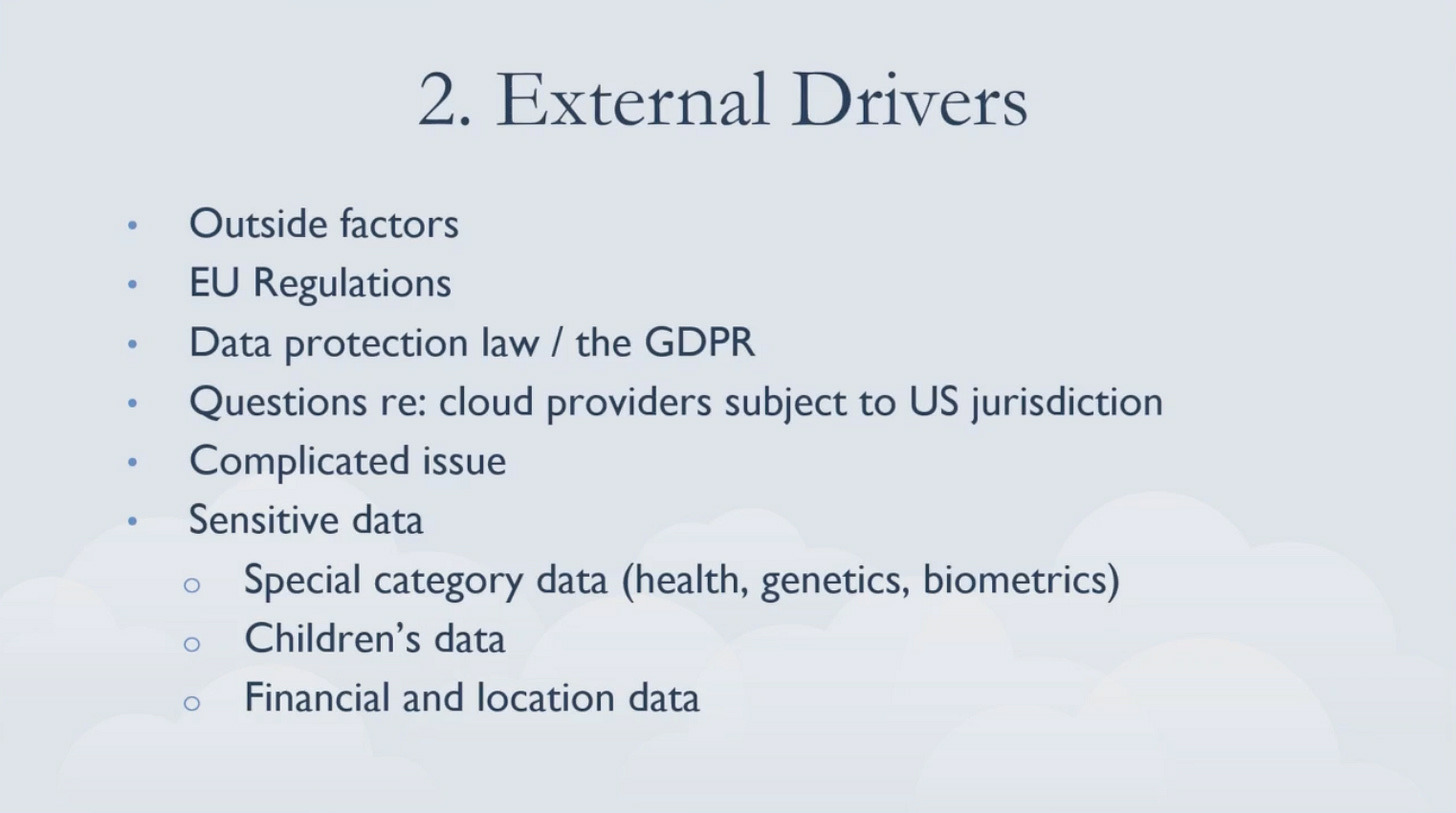Lots of links below, plus some sovereign cloud thinking from EU people in the Logoff.
Access to data shouldn’t be holding you can from enterprise AI radicalness
To make enterprise AI useful, you need your data:
Gartner Inc. predicts that organizations will develop 80% of Generative AI (GenAI) business applications on their existing data management platforms by 2028. This approach will reduce the complexity and time required to deliver these applications by 50%.
And, it’d good to spend a lot of time making sure you’ve got good data management and access because “without a unified management approach, adopting these scattered technologies leads to longer delivery times and potential sunk costs for organizations.”
Along with managing your AI usage - hosting your own models or brokering access to others - we’ve bundled together data and data management into the Tanzu Platform. The important part is that you can run Tanzu Platform on-premises, so it’s a lot easier to work with your existing data sets and enterprise-y silos. And, you get full control over your data and apps (see Logoff below for one angle on why that’s important).
And, since this integrates with Spring, you’re Java developers are set to go. But, also all those python apps can work easily with it too: you just point them at the Tanzu Platform AI end-points.
For many organizations - our current customers - there’s something even better. You don’t have to wait for a contract renewal window and then six of 12 months of putting it in place and finally turning it on. All you to have all of this: you’ve got it, pre-approved, already running, paid for, compliant and secure.
Why go through all that migration and procurement hassle when you have what you need?
(If you want to find out if you have the Tanzu Platform at your work, ask me, I’ll find out right quick.)

Maketing Plan
Check out this quick overview of how to put together a (mostly enterprise) software marketing plan. There’s all sorts of methods, forms (in both portrait and landscape mode), but, come on: just use this one as the base, change it if needed, and get on with the work.
Relevant to your interests
Tanzu reboots CloudHealth with enhancements to broaden FinOps use
Broadcom’s Private Cloud Outlook 2025 Report Reveals Definitive Cloud Reset - “More than half (53%) of survey respondents say private cloud is their top priority for deploying new workloads over the next three years, while 69% are considering workload repatriation from public to private cloud, with one-third having already done so. Private cloud is also now a strategic equal for AI and cloud-native apps, with 66% preferring to run container and Kubernetes-based applications on private cloud or a mix of public and private, while 55% prefer private cloud for AI model training, tuning and inference.”
United Airlines CEO: ‘We’re probably doing more AI than anyone’ - Finding what AI is useful for: ”’We started with an enormous number of [AI] use cases, and we whittled it down to the use cases that we want to spend money on,' COO and President John Waldron said during an investor conference last week. Enterprises can’t chase every lead. The share of companies abandoning most of their AI initiatives bumped up to 42% this year, compared to 17% last year, according to analysis from S&P Global Market Intelligence.”
Is AI just going to end up being about programming? - I think there’s about a 30% chance that the answer is yet. // Rather: AI is good at text. If you can get it into text, and you want text as the output: easy win.
Docling: An open-source tool kit for advanced document processing - Looks useful for getting precious text out of the PDF silo, from IBM.
MCP Is the New Control Point in AI—Are CIOs Ready for the Lock-In Battle? - They get the date of the spec’s release wrong (it was November 2024), and it has that Futurum cable TV news vibe, but good points are made, e.g.: “Will MCP remain truly portable, or will each vendor implement its own variation, selectively supporting features that reinforce its ecosystem? Early adopters should insist on full transparency in vendor MCP roadmaps, including plans for multi-cloud portability, third-party agent integration, and auditability of memory objects.” // There’s always someone to call lock-in FUD first - yes, and: good points made for any tech adoption in enterprises.
MCP Is RSS for AI: More Use Cases for Model Context Protocol - I like this: “I’m inclined to think of MCP as RSS for AI.” // Once prompts are used as intended - to be user initiated activity in the UI, we’ll see if things evolve. Think of an MCP prompt as adding a new button, or command to the UI…sort of. Most MCP things now are “tools” reading data or writing data, the AI puts some text into the tool, some text comes out. But, the tool user is the AI, not the human. Of course, the human can tell the AI to use it. We have demos of configuring Cloud Foundry this way. An MCP prompt’s user it meant to be a human, directly typing or clicking something. This might be too nuanced of a distinction and turn out not to be useful. The MCP clients, like Claude need better implementations of it (it should start with auto-complete slash commands, the example in the MCP spec!). // Another point: the MCP spec is making a big semantic gamble on the distinction between tools, prompts, and resources. Looking at all the tools so far, the others aren’t needed to get the functionality you want, but they do seem like a cleaner design. The people writing the MCP Servers will determine if those extra semantics (prompts and resources) are useful, needed.
What do people do all day? - Possible “can AI can replace my job?” heuristic: how long do you spend sitting at work?
Just because Silicon Valley is pumped to make this junk doesn’t mean people will buy it - Not a fan of AI glasses.
Using ChatGPT as a therapist - …people like it. Also, for the cost/benefit analysis, and the constant availability, it makes sense. // As with self-driving cars, this is also an example where we expect 100% accuracy and zero-risk from the AI and ignore the fact that humans (human therapists in this example) are not 100% perfect…usually far from it. // This is maybe the number one not-tech, not-work usage I hear about from normies.
Beyond Launch - Establish platform metrics early on. Not only to report on, but to mind-program people what to expect and how to think of ROI. Otherwise, the only way they’ll metric your platform is by “is it cheaper than it was last time.” // ‘In enterprise environments, silence gets interpreted as stagnation. Stakeholders will assume “if I’m not hearing about progress, there probably isn’t any” - and they’re usually right!’
Nine Rules for Evaluating New Technology - It should be cheaper, better, and not cause a lot of bullshit.
How to Lead an All-Hands After Delivering Bad News - “Create a shared mental model to make sure your team understands what the new context means for how they work together.” // That and, people also want to know: how will I know if I’m next and what I can do to prevent it?
Red Hat Summit 2025: AI, Virtualization, Hybrid Cloud, And The Future Of Enterprise IT
Cloud Repatriation is Getting Complicated - The repatriation thought-leading is taking hold. Even the bomb thrower is soaking in the ambient thought leadering!
Google Study: 65% of Developer Time Wasted Without Platforms - Better get a platform. // ‘Intriguingly, 86% of the survey’s respondents also said they believe that "platform engineering is essential to realizing the full business value of AI. " // “At the same time, a vast majority of companies view AI as a catalyst for advancing platform engineering, with 94% of organizations identifying AI to be ‘Critical’ or ‘Important’ to the future of platform engineering.”’
Reinvent the Wheel - ”Reinvent for insight. Reuse for impact.” // Yes, and: so long as the value of insight isn’t outweighed by the cost and risk of having to rewire all your day two stuff: how ops people manage and run it in production.
A New Look, A Clear Path - New IDC branding, logo, etc.
Donald Trump’s digital landgrab - File under “sovereign cloud”: “The state department is now claiming otherwise: if you’re on the internet and using a service provided by a US tech company, they say, then Donald Trump sets the rules. The US is quietly declaring sovereignty over cyberspace and expecting the world to acquiesce, making an unprecedented digital landgrab in the name of freedom.”
Moody Folkloric Fantasy – The Beast of Black Keep - This guy makes great, little adventures, here’s a new one.
Making books that fly, fold, wrap, hide, pop up, twist, and turn : books for kids to make - …and adults.
On the pleasure of reading private notebooks - Diaries (“journals”) and notebooks are the best, I love them as well. // “I think this is because our genuine thoughts (and interests) are more detailed and alive than the simulations we have of what we should say (or be interested in). When we think no one listens, we relax into the genuine. I’ve been told, repeatedly, that I hide my most interesting thoughts in the footnotes.” // “This is, I think, at the root of why I like reading private notes so much. There are so few places where we get to be close to other people and see the messy humanity they carry behind the identities they have polished for society life.” // There’s a certain kind of “comfort in knowing you’re not the only one” therapy in that.

Wastebook
“unhappens” Here.
JSON repatriation.
We were promised sentient computes, and all we got was call center automation.
Whatever the size, you probably only need half that sandwich.
“I need you to be helpful, not tell me everything that is wrong.”
“If my mom wanted good art on her fridge, she could’ve purchased reprints of works by Vermeer, Lichtenstein, Wyeth, etc. But she didn’t want good art – she wanted my art.”
“‘Paul Graham has published a blog post where he is wrong about something’ is not a news item so much as expected background radiation of contemporary life.” maya.land.
the soulless colleague, Val Thoermer.
Emotional support ice-pack.

Logoff
I’m watching The European Sovereign Cloud Day today. The opening talk by David Michels is really going hard on the Trump means you need to get out of the US cloud market. Two quotes so far:
“Will the US government hand over your data without informing you?”
“Does Donald Trump have a big red button her can press to cut you off from your cloud service?”
What kind of data should you be FUD’ing about? Here’s a slide:
That’s the data, pushing that “big red button” is something most people probably don’t think of. The US government can just tell American companies to shut off access, you know, like impose sanctions. It’s already happened to the International Criminal Court (ICC) Chief Prosecutor Karim Khan, whose email was shut off by Microsoft:
The blocked access, enforced by Microsoft, means Khan can no longer read messages sent to his official account. The decision, directly tied to U.S. foreign policy, reportedly underscores the vulnerability of Dutch public institutions that depend on American tech infrastructure. The incident has reignited political debate about the extent to which the Netherlands can—and should—continue relying on Microsoft.
That stuff makes cloud a lot different for Europeans…and any “sovereign” state or group.
Of course, the same applies to any country. The EU drives all those little cookie pop-ups, but also means I can use USB-C cables for all my devices. I don’t mind those so much, really.
